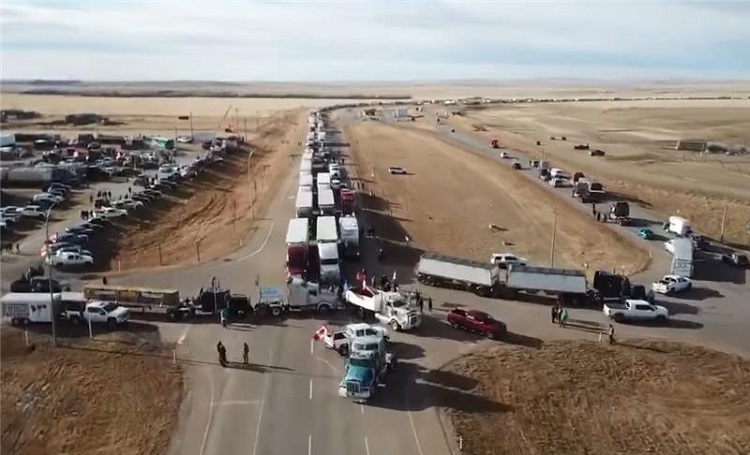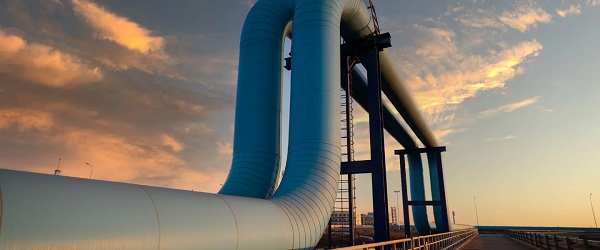Alberta
Coutts Three verdict: A warning to protestors who act as liaison with police

From the Frontier Centre for Public Policy
By Ray McGinnis
During the trial numbers of RCMP officers conceded that the Coutts Three were helpful in their interactions with the law. As well, there didn’t seem to be any truth to the suggestion that Van Huigenbos, Van Herk and Janzen were leaders of the protest.
Twelve jurors have found the Coutts Three guilty of mischief over $5,000 at a courthouse in Lethbridge, Alberta. Marco Van Huigenbois, Alex Van Herk and George Janzen will appear again in court on July 22 for sentencing.
Van Huigenbois, Van Herk and Janzen were each protesting at the Coutts Blockade in 2022. A blockade of Alberta Highway 4 began on January 29, 2022, blocking traffic, on and off, on Alberta Highway 4 near the Coutts-Sweetgrass Canada-USA border crossing. The protests were in support of the Freedom Convoy protests in Ottawa.
Protests began due to the vaccine mandates for truckers entering Canada, and lockdowns that bankrupted 120,000 small businesses. Government edicts were purportedly for “public health” to stop the spread of the C-19 virus. Yet the CDC’s Dr. Rachel Wallensky admitted on CNN in August 2021 the vaccine did not prevent infection or stop transmission.
By February 2022, a US court forced Pfizer to release its “Cumulative Analysis of Post-Authorization Adverse Event Reports” revealing the company knew by the end of February, 2021, that 1,223 people had a “case outcome” of “fatal” as a result of taking the companies’ vaccine.
On the day of February 14, 2022, the three men spoke to Coutts protesters after a cache of weapons had been displayed by the RCMP. These were in connection with the arrest of the Coutts Four. Van Huigenbos and others persuaded the protesters to leave Coutts, which they did by February 15, 2022.
During the trial numbers of RCMP officers conceded that the Coutts Three were helpful in their interactions with the law. As well, there didn’t seem to be any truth to the suggestion that Van Huigenbos, Van Herk and Janzen were leaders of the protest.
RCMP officer Greg Tulloch testified that there were a number of “factions” within the larger protest group. These factions had strong disagreements about how to proceed with the protest. The Crown contended the Coutts Three were the leaders of the protest.
During his testimony, Tulloch recalled how Van Huigenbos and Janzen assisted him in getting past the “vehicle blockade to enter Coutts at a time during the protest when access to Coutts from the north via the AB-4 highway was blocked.” Tulloch also testified that Janzen and Van Huigenbos helped with handling RCMP negotiations with the protesters. Tulloch gave credit to these two “being able to help move vehicles at times to open lanes on the AB-4 highway to facilitate the flow of traffic in both directions.”
During cross examination by George Janzen’s lawyer, Alan Honner, Tulloch stated that he noticed two of the defendants assisting RCMP with reopening the highway in both directions. Honner said in summary, “[Marco Van Huigenbos and George Janzen] didn’t close the road, they opened it.”
Mark Wielgosz, an RCMP officer for over twenty years, worked as a liaison between law enforcement and protesters at the Coutts blockade. Taking the stand, he concurred that there was sharp disagreement among the Coutts protesters and the path forward with their demonstration. Rebel News video clips “submitted by both the Crown and defence teams captured these disagreements as demonstrators congregated in the Smuggler’s Saloon, a location where many of the protesters met to discuss and debate their demonstration.” Wielgosz made several attempts to name the leaders of the protest in his role as a RCMP liaison with the protesters, but was unsuccessful.”
However, the Crown maintained that the protest unlawfully obstructed people’s access to property on Highway 4.
Canada’s Criminal Code defines mischief as follows in Section 430:
Every one commits mischief who willfully
(a) destroys or damages property;
(b) renders property dangerous, useless, inoperative or ineffective;
(c) obstructs, interrupts or interferes with the lawful use, enjoyment or operation of property; or
(d) obstructs, interrupts or interferes with any person in the lawful use, enjoyment or operation of property.
Robert Kraychik reported that “RCMP Superintendent Gordon Corbett…cried (no comment on the sincerity of this emoting) while testifying about a female RCMP officer that was startled by the movement of a tractor with a large blade during the Coutts blockade/protest.” This was the climax of the trial. A tractor moving some distance away from an officer in rural Alberta, with blades. The shock of it all.
No evidence was presented in the trial that Van Huigenbos, Van Herk and Janzen destroyed or damaged property. Officers testified they couldn’t identify who the protest leaders were. They testified the defendants assisted with opening traffic lanes, and winding down the protest.
By volunteering to liaise with the RCMP, the Crown depicted the Coutts Three as the protest leaders. Who will choose to volunteer at any future peaceful, non-violent, protest to act as a liaison with the policing authorities? Knowing of the verdict handed down on April 16, 2024, in Lethbridge?
Ray McGinnis is a Senior Fellow with the Frontier Centre for Public Policy. His forthcoming book is Unjustified: The Emergencies Act and the Inquiry that Got It Wrong.
Alberta
Premier Smith moves to protect Alberta in International Agreements

Protecting Alberta’s jurisdiction
The International Agreements Act ensures Alberta’s jurisdiction is protected and decisions that shape our future are made right here at home.
This legislation draws a clear line: international agreements that touch on provincial areas of jurisdiction must be debated and passed into law in Alberta.
Alberta, not Ottawa, will decide how international agreements that affect provincial matters apply in the province.
“As we return to the legislature, our government is focused on delivering on the mandate Albertans gave us in 2023 to stand up for this province, protect our freedoms and chart our path forward. We will defend our constitutional rights, protect our province’s interests and make sure decisions that affect Albertans are made by Albertans. The federal government stands at a crossroads. Work with us, and we’ll get things done. Overstep, and Alberta will stand its ground.”
While the federal government has the power to enter into international agreements on behalf of Canada, it does not have the legal authority to impose its terms on provinces. The International Agreements Act reinforces that principle, ensuring Alberta is not bound by obligations negotiated in Ottawa that do not align with provincial priorities.
Bill 1 was introduced by Premier Danielle Smith following the fall 2025 speech from the throne as part of Alberta’s commitment to defend its sovereignty within a united Canada.
Key facts
- If passed, the International Agreements Act will replace the International Trade and Investment Agreements Act.
- The new legislation would expand its scope beyond trade and investment to include all areas of provincial jurisdiction.
- Currently, there is no formal agreement or requirement for the federal government to consult provinces when negotiating international treaties.
- Quebec’s Act respecting the exercise of the fundamental rights and prerogatives of the Québec people and the Québec State came into force in 2000.
- International agreements do not apply in Quebec unless approved by the national assembly or the provincial government.
- Quebec must give clear consent before any international agreement takes effect.
Related information
Agriculture
From Underdog to Top Broodmare

WATCH From Underdog to Top Broodmare (video)
Executive Producers Jeff Robillard (Horse Racing Alberta) and Mike Little (Shinelight Entertainment)
What began as an underdog story became a legacy of excellence. Crackers Hot Shot didn’t just race — she paved the way for future generations, and in doing so became one of the most influential producers the province has known.
The extraordinary journey of Crackers Hot Shot — once overlooked, now revered — stands as one of Alberta’s finest success stories in harness racing and breeding.
Born in humble circumstances and initially considered rough around the edges, Crackers Hot Shot overcame long odds to carve out a career that would forever impact the province’s racing industry. From a “wild, unhandled filly” to Alberta’s “Horse of the Year” in 2013, to producing foals who carry her spirit and fortitude into future generations.
Her influence ripples through Alberta’s racing and breeding landscape: from how young stock are prepared, to the aspirations of local breeders who now look to “the mare that did it” as proof that world-class talent can emerge from Alberta’s paddocks.
“Crackers Hot Shot, she had a tough start. She wasn’t much to look at when we first got her” — Rod Starkewski
“Crackers Hot Shot was left on her own – Carl Archibald heard us talking, he said ‘I’ll go get her – I live by there’. I think it took him 3 days to dig her out of the snow. She was completely wild – then we just started working on her. She really needed some humans to work with her – and get to know that people are not scary.” — Jackie Starkewski
“Crackers Hot Shot would be one of the top broodmares in Albeta percentage wise if nothing else. Her foals hit the track – they’re looking for the winners circle every time.” — Connie Kolthammer
Visit thehorses.com to learn more about Alberta’s Horse Racing industry.
-

 Agriculture2 days ago
Agriculture2 days agoFrom Underdog to Top Broodmare
-

 Health2 days ago
Health2 days agoSovereignty at Stake: Why Parliament Must Review Treaties Before They’re Signed
-

 Business2 days ago
Business2 days ago$15B and No Guarantees? Stellantis Deal explained by former Conservative Shadow Minister of Innovation, Science and Technology
-

 RCMP2 days ago
RCMP2 days agoPolice arrest thieves using garage-door openers to access homes in Vanier, West Park, Anders Park, and Evergreen
-

 Bruce Dowbiggin2 days ago
Bruce Dowbiggin2 days agoWhile America Shrugs Off Woke, Canada Doubles Down On Feminizing Society
-

 Energy2 days ago
Energy2 days agoNational media energy attacks: Bureau chiefs or three major Canadian newspapers woefully misinformed about pipelines
-

 COVID-192 days ago
COVID-192 days agoCanadian veteran challenges conviction for guarding War Memorial during Freedom Convoy
-

 DEI1 day ago
DEI1 day agoConservative push to end Canada’s ‘anti-merit’ DEI programs receives support






